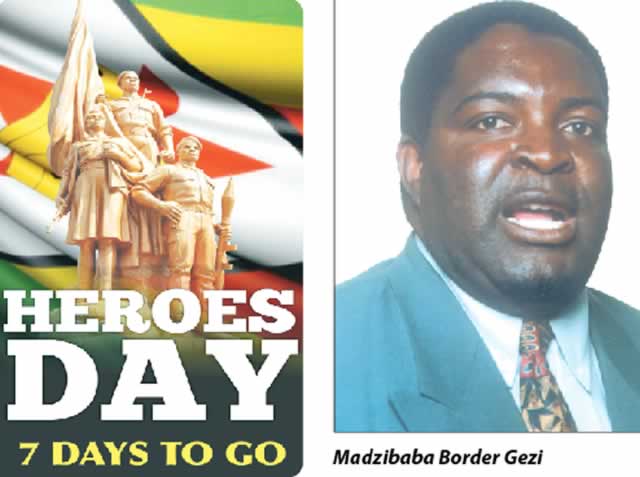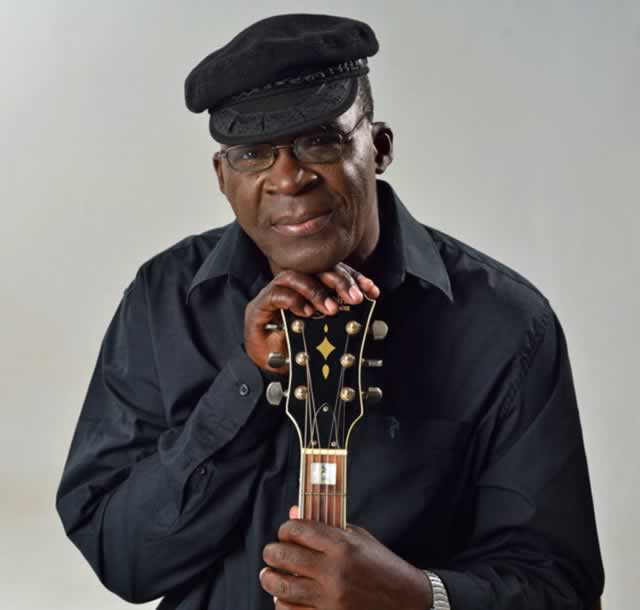Cde Border Gezi: A national hero of distinction

 Cde Border “Madzibaba” Gezi, without doubt one of Zimbabwe’s new generation of vibrant, energetic and people-centred nationalists, tragically died in a car accident on Saturday morning April 28, 2001 some 10km outside Mvuma along the Harare-Masvingo highway.
Cde Border “Madzibaba” Gezi, without doubt one of Zimbabwe’s new generation of vibrant, energetic and people-centred nationalists, tragically died in a car accident on Saturday morning April 28, 2001 some 10km outside Mvuma along the Harare-Masvingo highway.
In a condolence message, His Excellency the President, Cde R. G. Mugabe, paid tribute to Cde Gezi and spoke for all Zimbabweans when he described him as someone who was no ordinary person in every sense of the phrase, a true and rare revolutionary and nationalist par excellence, a man of the people, dedicated to serving all Zimbabweans.
Cde Gezi was born on December 17, 1964 at Gezi Village in the Mashonaland Central district of Guruve. His father, Moses Chibarara, was a peasant farmer and nationalist who at one time served as chairman of ZANU PF’s Mudhindo District. His mother, Emilda Chibarara (nee Gezi), was a housewife. Cde Gezi was the first born of two siblings with his late sister, Sarudzai.
He attended Muzika Primary School in Guruve and Holy Rosary Secondary School in Mvurwi.
Like most rural boys who in the days of the liberation struggle were subjected not only to the punching vagaries of economic deprivation and political disenfranchisement but also to constant harassment and untold brutality by the notorious Rhodesian forces, Cde Gezi was challenged by the dynamics of the liberation struggle and its harsh realities at an early age.
Thus, at the tender age of 14, Cde Gezi’s unparalleled service to Zimbabwe started when he established contact with Zanla forces who were operating in the Mvurwi area. Cde Gezi received training from these ZANLA forces and became active with them, teaming up with other young rural boys, the “mujibhas” in the Nehanda Sector of Tete Province, covering Detachments “C” and “D” in the then Sipolilo area, now Guruve.
By 1978, the youthful Gezi had started demonstrating natural skills of an organisational genius, the recognition of which led to his promotion to political commissar and serving Alpha Assembly Point at Hoya in Muzarabani during the ceasefire period. Cde Gezi left the assembly point in 1980 to return to complete his education at Holy Rosary Secondary School in Mvurwi.
Cde Gezi was a devoted and lifelong member of the Johane Masowe faith and during his activism as a trained “mujibha”, especially between 1977 and 1978, he took full advantage of his tender age and membership of the Johane Masowe Church to elude and break the security net of Rhodesian forces and their sellout allies.
Between 1980 and 1984 Cde Gezi was the Mazowe District’s Youth Secretary. His exemplary leadership qualities and organisational skills were displayed when he became the youngest councillor in the then white-dominated Umvukwes Rural District Council. He resisted pressure from the majority white commercial farmer councillors who were opposed to the development of infrastructure in the rural areas mostly occupied by blacks.
In 1984 Cde Gezi was elected Mashonaland Central Youth Provincial Secretary for Information and Publicity and held the post until 1987. He was the province’s Youth Secretary for Administration from 1987 to 1989 when he was elected to the Central Committee as Youth National Secretary for Production and Labour.
Cde Gezi was elected Member of Parliament for Centenary constituency in 1990. In Parliament he was appointed a member of the Parliamentary Committee on Security Ministries.
In 1993, Cde Gezi was elected ZANU-PF provincial chairman for Mashonaland Central. His formidable task was to regain and reassert the unity of the party in the province, which he managed to do admirably well. His success was demonstrated by the performance of the party in the 1995 and 2000 parliamentary elections when ZANU-PF swept all seats in the province.
Cde Gezi won the Muzarabani constituency seat by an overwhelming margin. In Parliament, he was appointed member of the Standing Rules and Orders Committee and the Public Accounts Committee. During his tenure as MP for Muzarabani, he did not allow the vastness of the area and poor road and communication network to come between him and the community he served. Sometimes, Cde Gezi would walk more than 25km to reach the next village or cover large areas on a bicycle.
Cde Gezi’s political career reached new heights when in 1996 he was appointed Provincial Governor and Resident Minister for Mashonaland Central Province. His services now found expression throughout the whole province then ranked among the lowest on the national development index.
Under Cde Gezi’s leadership, Mashonaland Central Province delivered one of the most resounding “yes” votes by any province during the referendum on the draft Constitution prepared by the then Constitutional Commission in February 2000.
Indeed, “Madzibaba” Border Gezi met his tragic death in the service of the people as he was on his way to a crucial meeting in Masvingo to disburse $1,6 million to support community development projects. The next day, he was scheduled to preside over the election of a new provincial executive for Mashonaland East as part of his exemplary effort in restructuring the party to make it more effective at the grassroots level.
When His Excellency, President Mugabe, appointed Cde Gezi into the Cabinet as Minister of Youth Development, Gender and Employment Creation, Cde Gezi immediately won the hearts and minds of all Zimbabweans by spearheading vibrant economic empowerment projects throughout the country. Cde Gezi’s revolutionary commitment to advancing the well-being and interests of the youth found concrete expression not only in the economic empowerment projects he initiated and implemented through the Ministry of Youth Development, Gender and Employment Creation, but also through his active support for the Child Parliament forum.
Cde Border “Madzibaba” Gezi’s lifetime personified the Zimbabwean struggle for total liberation. He was not only born in the struggle, nor did he only live it, but he also led it. His leadership was particularly appreciated by all Zimbabweans in the trying times of the Third Chimurenga when the need to consolidate the political gains of the Second Chimurenga had never been greater.
Cde Gezi was a major inspiration behind the Third Chimurenga. In him and through his work and total commitment, all Zimbabweans who either believe in social justice or are seeking it, found a voice, a leader and, above all, a true and rare revolutionary. Cde Border Gezi is a national hero of distinction.









Comments